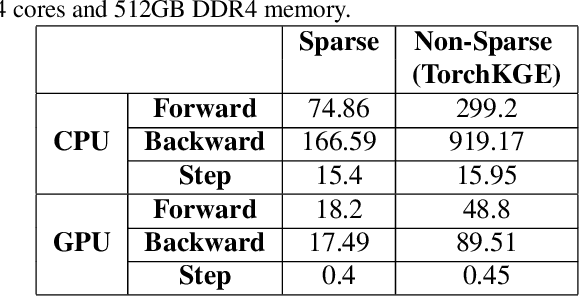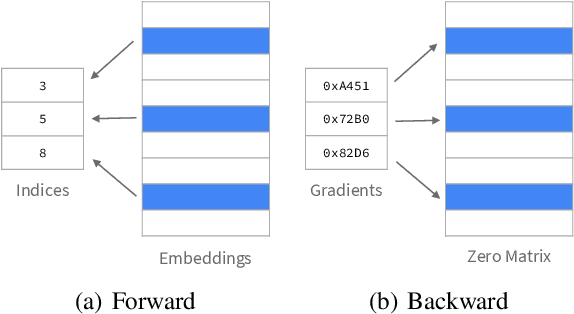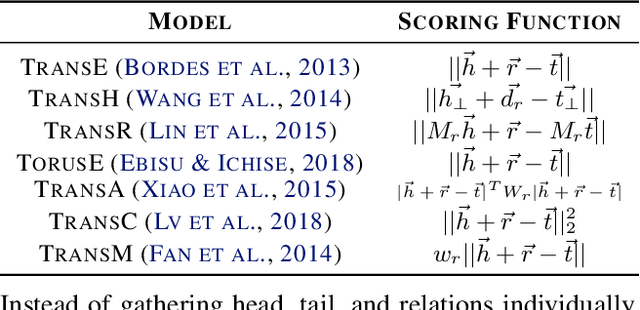Md Saidul Hoque Anik
SparseTransX: Efficient Training of Translation-Based Knowledge Graph Embeddings Using Sparse Matrix Operations
Feb 26, 2025



Abstract:Knowledge graph (KG) learning offers a powerful framework for generating new knowledge and making inferences. Training KG embedding can take a significantly long time, especially for larger datasets. Our analysis shows that the gradient computation of embedding is one of the dominant functions in the translation-based KG embedding training loop. We address this issue by replacing the core embedding computation with SpMM (Sparse-Dense Matrix Multiplication) kernels. This allows us to unify multiple scatter (and gather) operations as a single operation, reducing training time and memory usage. We create a general framework for training KG models using sparse kernels and implement four models, namely TransE, TransR, TransH, and TorusE. Our sparse implementations exhibit up to 5.3x speedup on the CPU and up to 4.2x speedup on the GPU with a significantly low GPU memory footprint. The speedups are consistent across large and small datasets for a given model. Our proposed sparse approach can be extended to accelerate other translation-based (such as TransC, TransM, etc.) and non-translational (such as DistMult, ComplEx, RotatE, etc.) models as well.
iSpLib: A Library for Accelerating Graph Neural Networks using Auto-tuned Sparse Operations
Mar 21, 2024Abstract:Core computations in Graph Neural Network (GNN) training and inference are often mapped to sparse matrix operations such as sparse-dense matrix multiplication (SpMM). These sparse operations are harder to optimize by manual tuning because their performance depends significantly on the sparsity of input graphs, GNN models, and computing platforms. To address this challenge, we present iSpLib, a PyTorch-based C++ library equipped with auto-tuned sparse operations. iSpLib expedites GNN training with a cache-enabled backpropagation that stores intermediate matrices in local caches. The library offers a user-friendly Python plug-in that allows users to take advantage of our optimized PyTorch operations out-of-the-box for any existing linear algebra-based PyTorch implementation of popular GNNs (Graph Convolution Network, GraphSAGE, Graph Inference Network, etc.) with only two lines of additional code. We demonstrate that iSpLib obtains up to 27x overall training speedup compared to the equivalent PyTorch 2.1.0 and PyTorch Geometric 2.4.0 implementations on the CPU. Our library is publicly available at https://github.com/HipGraph/iSpLib (https://doi.org/10.5281/zenodo.10806511).
 Add to Chrome
Add to Chrome Add to Firefox
Add to Firefox Add to Edge
Add to Edge